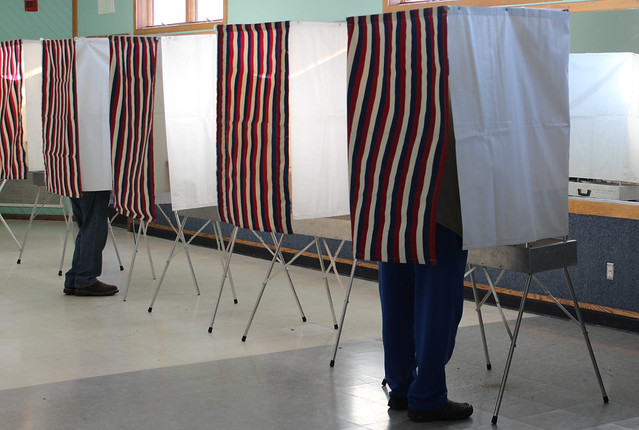Would a Federal Takeover of Elections be Constitutional?
/Earlier this month, the New York City comptroller announced an audit to determine whether Democrats were improperly removed from voter rolls before the New York state primary. This follows similar concerns about the Arizona primary the previous month.
Election Day controversy is nothing new. From long lines at minority polling places, to the questionable reliability of our voting machines, to the infamous butterfly ballot that very likely decided the 2000 election, every voting cycle brings mistakes or poor decisions by state and local agencies tasked with administering our elections.
I think it's easy to forget how unusual it is that America delegates such an important function to the states. As professor Lani Guinier puts it in a 2008 law review article, while "[t]he IRS does not delegate to counties, municipalities, or school districts the unsupervised ability to enforce the federal tax code . . . . the federal government defers to fifty states and 13,000 locally administered jurisdictions the barely regulated responsibility to enforce the right to vote in national elections.” Lani Guinier, “Demosprudence Through Dissent,” 122 Harv. L. Rev. 4 (2008).
Such “hyperfederalized” elections are fairly unique; most European countries, for instance, require voters to register with a national agency, and in both of our North American neighbors the federal government administers national elections. In the United States, by contrast, the experience of acquiring a ballot will vary widely based on which state, which county, and even which street the voter lives on.
What if America wanted to standardize the election process, and create a national voter registry. Would it have the authority to do so (setting aside practical and political obstacles)? Surprisingly, the answer might be “yes” as to elections for Congress, but “no” as to elections for the presidency.
Article I, Section 4 of the Constitution states that “[t]he Times, Places and Manner of holding Elections for Senators and Representatives, shall be prescribed in each State by the Legislature thereof,” but that “the Congress may at any time by Law make or alter such Regulations, except as to the Places of chusing Senators.” Id.
Article II, Section 1 states that “[e]ach State shall appoint, in such Manner as the Legislature thereof may direct, a Number of [presidential] Electors,” but that Congress may “determine the Time of choosing the Electors, and the Day on which they shall give their Votes.” Id.
The Founders initially conceived of this federal oversight as a backstop in the unlikely case of a state maliciously attempting to sabotage the national government. In Federalist No. 59, Alexander Hamilton writes that the Constitutional Convention consigned elections “in the first instance, to the local administrations; which, in ordinary cases, and when no improper views prevail, may be both more convenient and more satisfactory; but they have reserved to the national authority a right to interpose, whenever extraordinary circumstances might render that interposition necessary to its safety.”
For decades, Hamilton's view that the federal government should interfere with elections only in "extraordinary circumstances" prevailed; the first federal statute passed under the Elections Clause did not come until 1842, over 50 years after the Constitution was ratified. Outside the black helicopter set’s fever dreams about federal takeovers, the United States government has never accepted for itself the role of actually administering national elections.
However, while the original intent of the Elections Clause may have been narrow, the language itself is unbounded. In the last 150 years the Supreme Court has recognized an expansive right of the federal government to control national elections for Congress, coupling the express authority in the Elections Clause with the Congress's general authority under Article I, Section 8 to make laws “Necessary and Proper” to the exercise of its powers.
In 1879, in an early case upholding the right of the federal government to punish states for electoral fraud, the Supreme Court stated that the “Congress has plenary and paramount jurisdiction over the whole subject” of congressional elections, and this power “may be exercised as and when Congress sees fit to exercise it.” Ex Parte Siebold, 100 U.S. 371 (1879). “When exercised, the action of Congress, so far as it extends and conflicts with the regulations of the State, necessarily supersedes them.” Id. In 1884, upholding federal anti-intimidation statutes, the Court stated that any doubts about federal power over elections arose “only because the Congress of the United States, through long habit and long years of forbearance, has, in deference and respect to the States, refrained from the exercise of these [powers].” Ex parte Yarbrough, 110 U.S. 651 (1884).
More recently, in Foster v. Love, 522 U.S. 67 (1997), the Court stated that the Constitution “invests the States with responsibility for the mechanics of congressional elections, but only so far as Congress declines to pre-empt state legislative choices. Thus it is well settled that the Elections Clause grants Congress ‘the power to override state regulations’ by establishing uniform rules for federal elections, binding on the States.”
Under this authority the federal government has imposed substantial rules on how the states conduct national elections, such as setting them on the first Tuesday in November (3 U.S.C. § 1; 2 U.S.C. §§ 1, 7), mandating that states elect Representatives using single-member Congressional districts instead of statewide slates of candidates (2 U.S.C § 2c), enforcing an equal right to vote through the Voting Rights Act (52 U.S.C. § 10101), and requiring that states distribute a standard voter registration form (52 U.S.C. § 20501).
This is not to say that the Congress’s ability to make election laws is boundless; however, the cases where the Supreme Court has struck down federal voting statutes have tended to involve the federal government imposing a tangible burden on the states, such as the preclearance requirement of the Voting Rights Act that was struck down in Shelby County v. Holder, 570 U.S. ___ (2013), which required certain states to go through a lengthy pre-approval process to change election laws. These limitations would not seem to impact the federal government's ability to take over the role for itself; indeed “the Elections Clause ensured that the federal government could conduct federal elections even if a state refused to do so,” Justin Weinstein-Tull, “Election Law Federalism,” 114 Mich. L. Rev. 747 (2016), and I see no reason why this right would not apply even in the absence of a state's abdication, given how expansively the Elections Clause has been interpreted.
However, this conclusion applies only to the federal government's right to administer congressional elections. That still leaves the issue of state-level elections and the presidency.
On the first point, Congress has extremely limited power to regulate the internal operations of state governments, generally only when the state violates or threatens to violate the civil rights of its citizens. Thus while Congress has the Fourteenth Amendment authority to ensure due process and the equal protection of the laws in regard to voting, it lacks a general authority to regulate how statewide elections take place. To a large extent, federal control over state-level elections occurs simply because states choose to hold their own elections on the same day as the federal election, and Congress’s powers over national elections “[are not] annulled because an election for state officers is held at the same time and place.” Ex parte Yarbrough, supra. In fact, at times in our country's history a handful of states have experimented with bifurcating their state and federal elections, but every one abandoned the exercise due to the increased burden and expense of holding two elections.
This would not be the case if the federal government actually commandeered federal elections – you can bet that few states would voluntarily hand their own internal elections to a federal bureaucracy and most would continue to administer state-wide elections. You would likely see separate voting processes for congressional and state elections, and possibly twin voter lists as well.
Regarding the presidency, recall that while the feds are granted authority to regulate the “Times, Places and Manner” of elections to the Congress, they're only explicitly granted authority to regulate the “Time” at which presidential electors are selected, and the day on which they vote for the president. Art. II, § 1.
In practice, the Congress is not limited to such narrow control. The Supreme Court has recognized a much broader authority to regulate presidential elections, reasoning that “Congress, undoubtedly, possesses that power, as it possesses every other power essential to preserve the departments and institutions of the general government from impairment or destruction, whether threatened by force or by corruption.” Burroughs v. U.S, 290 U.S. 534 (1934) (upholding laws against corruption in presidential campaigns). Appellate courts following Burroughs have stated that “[t]he broad power given to Congress over congressional elections has been extended to presidential elections,” Voting Rights Coalition v. Wilson, 60 F. 3d 1411 (9th Cir. 1995), and that the Congress’s authority over presidential elections in “coextensive” with its authority over congressional elections, Acorn v. Edgar, 56 F. 3d 791 (7th Cir. 1995).
Still, the fact remains that a much weaker foundation supports an expansive reading of Congress’s ability to dictate presidential elections, and this broad interpretation would need to stretch quite far to encompass a federal takeover of presidential voting. Most importantly, there's no actual requirement in federal law or the Constitution that states hold a popular vote to decide how to allocate their electors - though every state has done so since 1876 - and a federally administered presidential election would seem to impose on this sovereign choice by forcing a vote to take place. An attempt to engineer a complete takeover of presidential elections would, in my view, exceed the Court's willingness to expand federal power over presidential elections beyond the strict text of the Constitution.
American federalism is a strange creature -- elections are the ultimate foundation of our national existence, yet considerable authority is ceded to the states and their local agencies. While the federal government might have the power to administer federal congressional elections, presumably states would be unwilling to cede their power to administer local and presidential elections, and practically we're not going to see two separate systems anytime soon. For the foreseeable future, substantial responsibility for administering the selection of the most powerful person in the world will fall to people like your mom's friend on the school board.

